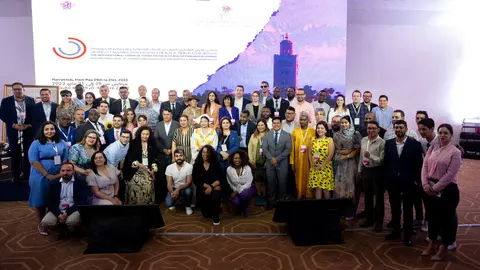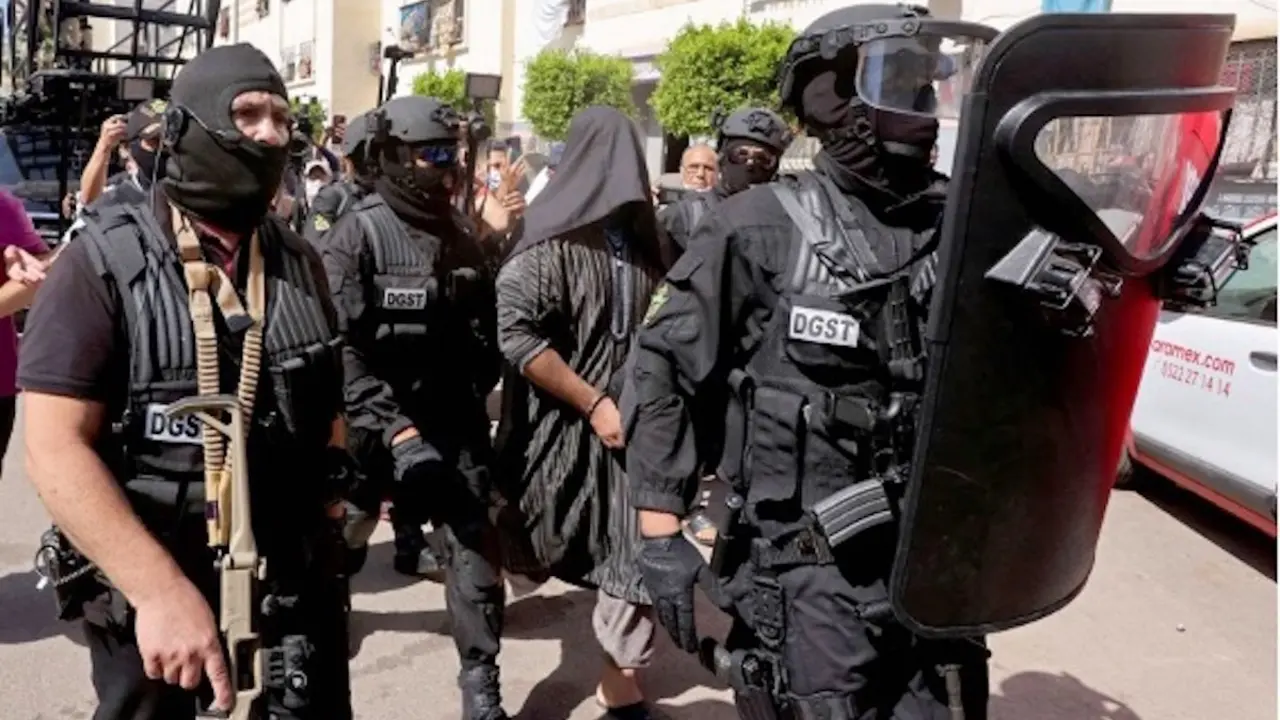"Every social democrat must be a human rights activist"

In recent years we have experienced a significant increase in migration flows in several regions of the world. In many cases, these movements are a response to the lack of opportunities or insecurity in the countries of origin, which leads people to seek a destination that offers better conditions. However, as migration has grown, so has xenophobia and racism, particularly within Western societies.
This represents a major challenge, as the issue of migration is used by extreme right-wing and populist politicians to fuel hatred and rejection. For this reason, young Western socialists and social democrats have a key role to play in addressing this issue.
Because of the relevance of migration, a session on the second day of the first International Forum of Young Socialist and Social Democratic Parliamentarians in Marrakech was devoted to this issue. As the moderator of the panel, Fadwa Rajouani, a Moroccan researcher in the field of migration, began by pointing out, "every social democrat must be an activist who defends human rights, in particular the rights of migrants".

Migration has become a political issue in the West that is exploited in election campaigns. In this regard, Driss El Yazami, president of the Council of the Moroccan Community Abroad, highlights in particular the role of the media in propagating this hate speech. "This media coverage shows us that migrants only want to go north, when in Africa many people stay on the continent itself," he explained. "That all poor people want to migrate north is false," El Yazami added.
Regarding the role that the media should play, Hala Kanjo, a researcher in the field of migration, proposes that journalists should effectively give a voice to migrants through interviews or broader coverage. She also suggests the possibility of collaborating with experts and organisations to develop programmes to raise awareness of the issue. On the other hand, she insisted that the media should avoid stereotypes and clichés.

To conclude his speech, the president of the Council of the Moroccan Community Abroad referred to the 2018 Marrakech Pact for Migration at the initiative of Morocco. However, this project has not been implemented by the countries of the North, despite the efforts of socialists such as Spain's Felipe González.
In this difficult context, what role should European socialists play? For Nelson Brito, a Portuguese Socialist MP, progressivism must combat populism and the extreme right, two movements that are gaining more and more support in European countries such as Italy, France and Hungary. "The Socialist Party and its youth must be vigilant," said Brito, stressing that the way forward for socialism in Europe and the world is social justice.

Diana Barreras Samaniego, a Mexican Member of Parliament, and Youssouf Aya, a former Malian Member of Parliament, were also present to give a broader perspective on migration. Barreras Samaniego described the harsh conditions faced by citizens from Central American countries such as El Salvador who flee the lack of opportunities and insecurity in pursuit of the "American dream".
Aya also referred to the lack of prospects and stability, the main reasons for migration in the region. He called on southern leaders to work to promote good governance. "It is the responsibility of southern governments to ensure well-being. However, this issue cannot be addressed without taking into account the effects of colonialism," he explained.
For the former MP from Mali, "a world without migration is inconceivable". "Migration should not be a problem", he stressed. Finally, he called for closer ties between Africa and Latin America in order to improve the well-being of the populations of the global south.

Unfortunately, due to current xenophobia and racism, migration is a term that has to go hand in hand with the protection and promotion of human rights, which is key to socialist and social democratic policies. For this reason, the second session focused on this issue, making reference to the approaches and mechanisms used by the United Nations.
This round table discussion included the participation of Houira Essalami, former head of the UN team for forced disappearances; Ángel Maravilla Murcia, MP and President of the Human Rights Commission of the Central American Parliament; Jamila Essyouri, expert in the defence of human rights; Joaquín Andrés Blanco, Argentinian Socialist MP; Vanessa Robertazzo, Venezuelan MP; and Redouane Adghoghi, Director of European Affairs in the Moroccan Ministry of Foreign Affairs.
Adghoghi focused his speech on highlighting Morocco's political achievements. "The values that you share are values that have a lot to do with our model of society", the Director of European Affairs assured the Socialist deputies. Adghoghi recalled that the Kingdom opted for political pluralism after independence, unlike many other countries. "Morocco has become a point of reference", Adghoghi continued, mentioning aspects of its foreign policy, its association and good neighbourhood agreements and its trade relations.

Within the Kingdom's foreign policy, Adghoghi underlined a key issue for the Kingdom: the question of the Sahara. "Morocco was colonised by two countries and a region was amputated from Morocco, although after our independence we began to regain our sovereignty," he explained. Adghoghi denounced the fake news and misinformation about this issue. "Morocco is presented as colonising its own territory", he said.
In terms of the protection of human rights, Latin America played an important role during the day, with the cases of Argentina and Venezuela standing out. In this respect, the Argentinian Socialist Joaquín Andrés Blanco called for the example of the brave Mothers of the Plaza de Mayo during the dictatorship to be taken as an example to combat the hate speeches of the ultra-right, an ideology that criticises the mechanisms of politics but uses them to reach power. "The great challenge for left-wing parties is to come up with a serious proposal that offers hope to young people without prospects," Blanco concluded.
On the other hand, Venezuelan MP Vanessa Robertazzo denounced the censorship and human rights violations suffered by her people, recalling that not all opposition to the Venezuelan regime is right-wing. She called on the international democratic left to look at Venezuela and what is happening within its borders. She also called on the international community to support the Venezuelan people, but without violent actions or sanctions, since this economic punishment really affects the citizens and not the rulers.

"A single word of hatred is enough for a war to break out"
The second day of the forum ended with a session dedicated to achieving more tolerant societies and the fight against hatred and extremism. "Democracies have succeeded in creating tolerant societies because democracy recognises pluralism," began Khadouj Slasi, a Moroccan MP.
Then it was the turn of Hana Jalloul Muro, Vice-President of the Socialist International and member of the Spanish Socialist Workers' Party. Jalloul Muro explained initiatives to combat stereotypes on social networks promoted by the Spanish socialist government, as well as local programmes to welcome Syrian refugees. She also pointed out the need to implement inclusion programmes in schools for young people. "Sport is a mechanism for social inclusion," she said.

If we are talking about extremism, it is necessary to mention the situation of minorities in the Middle East, who have been the target of attacks and persecution for centuries. Razeen Ziyad Sido, a Kurdish member of the Iraqi parliament, spoke on this issue.
Sido focused on denouncing the situation of minorities in the region, in particular the Yazidi community, which was the target of genocide by Daesh in 2014. "The number of Yazidis has dwindled, the only solution was forced exile," Sido said. However, despite hate speeches by religious leaders, the Kurdish MP also wanted to highlight the existence of civil society organisations that promote peace among all the communities that make up the Iraqi people. Sido concluded her speech by calling on social democratic parties to stand up for all minorities.

Another region of the world that has suffered greatly from hate speech and extremism is Central Africa. "A single word of hatred is enough for a war to break out. Words can provoke genocide," declared socialist Dounda Ndamon.
Hamid Jamahri, a Moroccan journalist and expert in intercultural dialogue, brought the session and the day to a close. Jamahri praised Arab socialist thought, defining it as a "historic opportunity that gave the Arab peoples a place on the international stage".
Finally, he welcomed Morocco's cultural and ethnic diversity, highlighting the Kingdom's Jewish component. "All monarchs have defended the Hebrew legacy, the current Constitution reflects the Hebrew identity of Morocco", he stressed. Jamahri therefore called on Arab and non-Arab people to "promote diversity".









